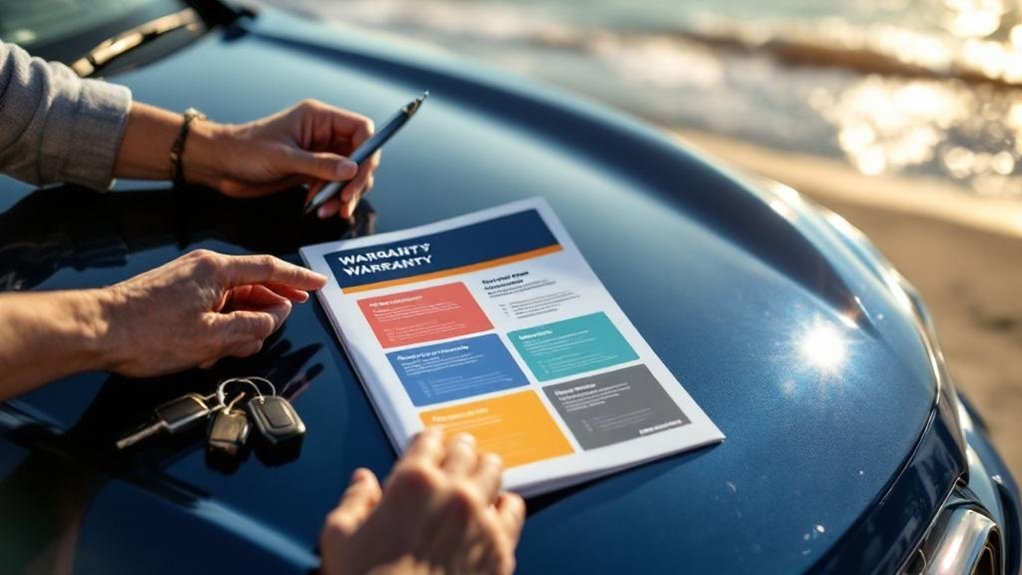Atlantic drivers face a complex landscape when it comes to vehicle warranty options (something Carlantic helps demystify). Understanding the differences between manufacturer warranties, extended plans, and third-party offerings is essential. Each choice presents unique benefits and potential drawbacks. As drivers weigh their options, they must consider what best suits their needs and budget. The decision can greatly impact their vehicle’s protection. What factors should they prioritize to make an informed choice?
Understanding Manufacturer Warranties
Manufacturer warranties serve as an important safety net for Atlantic drivers, providing assurance against defects and unforeseen issues. These warranties typically cover a vehicle’s basic components, including the engine, transmission, and electrical systems, for a designated period or mileage. They vary considerably between manufacturers, with some offering extensive coverage while others provide limited terms. Understanding the specifics of these warranties is vital for drivers, as they outline the conditions under which repairs are covered. Many warranties also include roadside assistance, enhancing the overall value. However, it is important for drivers to be aware of exclusions and limitations, as failing to adhere to maintenance schedules can void coverage. Consequently, knowing the details of a manufacturer warranty empowers Atlantic drivers in their vehicle ownership experience. Furthermore, having a well-organized database of warranty options can help drivers make informed decisions on the best coverage for their needs.
Exploring Extended Warranty Options
What additional protections can Atlantic drivers secure beyond the standard manufacturer warranty? Extended warranties, often explained by used car dealers in Nova Scotia offer drivers peace of mind by covering repairs and services that may arise after the manufacturer warranty expires. These warranties can be tailored to individual needs, providing options such as powertrain coverage, thorough vehicle protection, and roadside assistance.
Many extended warranties also include benefits like rental car reimbursement and trip interruption coverage, enhancing the overall ownership experience. Drivers should consider their vehicle’s reliability and the potential costs of major repairs when evaluating whether to invest in an extended warranty. By understanding the various options available, Atlantic drivers can make informed decisions that align with their driving habits and budgetary constraints. Effective payment recovery strategies can significantly impact a company’s bottom line, making it essential for drivers to weigh their warranty options carefully.
Comparing Third-Party Warranty Plans
While extended warranties from manufacturers provide valuable coverage, many Atlantic drivers also explore third-party warranty plans as an alternative. These plans often offer competitive pricing and flexible options tailored to individual needs. Drivers can find various levels of coverage, from basic powertrain protection to all-encompassing plans that include additional services like roadside assistance and rental car reimbursement.
However, the quality of third-party warranties can vary greatly. Some providers may impose strict terms, limited repair networks, or numerous exclusions. As a result, it is essential for drivers to research the reputation of the warranty company, read customer reviews, and compare multiple plans. By doing so, Atlantic drivers can make informed choices and select a warranty that best suits their driving habits and budget. Moreover, analyzing customer interactions can provide valuable insights into market needs and preferences, helping drivers choose the most suitable warranty options.
Key Features to Look for in a Warranty
When selecting a warranty, Atlantic drivers should prioritize key features that will guarantee thorough coverage and peace of mind. Essential factors include the types of components covered, which should ideally encompass both mechanical and electrical parts. Drivers should also look for flexible terms regarding mileage and duration, allowing for customized usage patterns. A straightforward claims process is essential, ensuring quick and efficient service when issues arise. Additionally, consider the warranty provider’s reputation and customer service track record, as these can greatly impact the overall experience. Transparency in contract details, including any exclusions or limitations, is important, enabling drivers to make informed decisions. Finally, look for transferable options, enhancing the vehicle’s resale value. Effective database management can also play a crucial role in tracking warranty claims and ensuring customer satisfaction.
Common Pitfalls to Avoid When Choosing a Warranty
Many drivers fall into common traps when selecting a warranty, which can lead to dissatisfaction and unexpected costs. One frequent pitfall is overlooking the fine print. Many warranties include exclusions that limit coverage, catching drivers off guard when claims are denied. Additionally, failing to compare multiple options can result in paying more for less extensive protection. Some drivers may also underestimate the importance of a warranty’s transferability, which can affect resale value. Another mistake is not considering the warranty provider’s reputation; opting for lesser-known companies can lead to poor customer service experiences. Finally, drivers should avoid choosing a warranty based solely on price, as cheaper options often compromise on essential coverage. Awareness of these pitfalls can enhance warranty satisfaction, and understanding the renewable energy market can provide insight into making informed financial decisions.
Frequently Asked Questions
How Do I Transfer My Warranty to a New Owner?
To transfer a warranty to a new owner, the original owner must contact the warranty provider, provide necessary documentation, and complete any required forms. Specific procedures may vary based on the warranty terms and conditions.
Can I Purchase a Warranty After My Car Purchase?
Yes, a warranty can be purchased after a car purchase. Many dealerships and third-party providers offer extended warranties that cover various components, ensuring protection against future repair costs for the vehicle owner.
Are Routine Maintenance Costs Covered by Warranties?
Routine maintenance costs are generally not covered by warranties. Warranties typically focus on repairs related to defects or malfunctions, leaving routine services like oil changes and tire rotations the owner’s responsibility. Understanding coverage details is essential.
What Happens if My Car Is Totaled While Under Warranty?
If a car is totaled while under warranty, the warranty typically becomes void. The owner may file a claim with their insurance, but the warranty’s benefits are lost, as the vehicle is no longer operational.
How Can I File a Claim on My Warranty?
To file a warranty claim, the individual must contact the warranty provider, gather necessary documentation such as receipts and service records, and submit a claim form, detailing the issue and any relevant information for review.
Conclusion
To summarize, Atlantic drivers must carefully evaluate their warranty options to guarantee maximum vehicle protection. By understanding the differences between manufacturer warranties, extended plans, and third-party offerings, they can make informed decisions that align with their specific needs and budgets. Key features and potential pitfalls should also be considered to enhance the overall value of the chosen warranty. Ultimately, a thoughtful approach will lead to greater peace of mind and security on the road.






